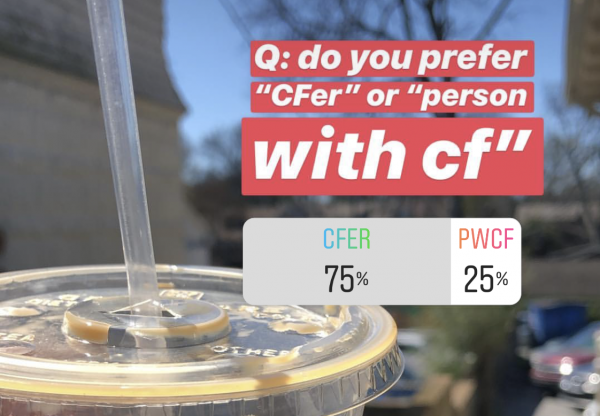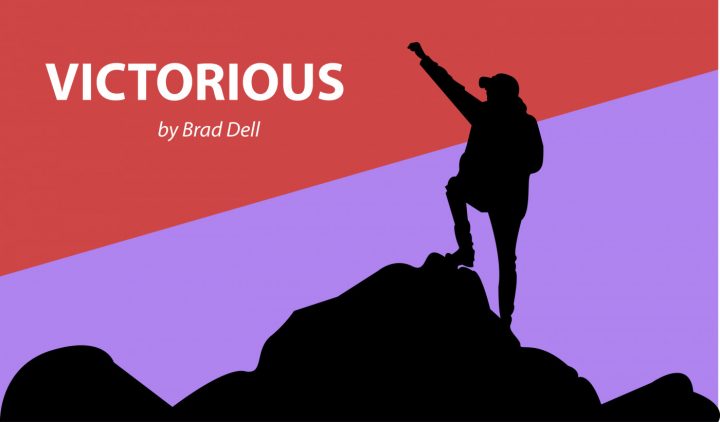‘CFer’ or ‘Person with CF’? I’m a CFer and Proud of It

(Photo by Joshua Stephens)
Note: I do not write on behalf of the entire CF community. No one does. This is about my preference.
The most amusing, yet irritating, thing a person without chronic conditions can do to me is correct the language I use to talk about myself.
“Oh, shouldn’t you say ‘person with deafness’ instead of ‘Deaf‘?”
“CFer? People-first language, Brad. You’re a person with cystic fibrosis. Remember that.”
“Isn’t ‘CFer’ just letting the disease define you?”
Well, yeah. I am defined in large part by my disease and my deafness. I am proud to face these struggles successfully.
I don’t care what you call me, but I know myself as a ”Deaf CFer.”
It’s ironic that the same people who mock horror at my self-descriptions are those who attempt to force me into an identity box. In the same breath that they tell me not to let something outside my control label me, they try to do precisely that by planting insecurities. They make me wonder if having CF is something shameful to include in my identity.
CF and deafness have molded me more than any force outside of faith — and my suffering is what cultivated my Christianity! I mean, the disease is hardwired into my DNA, after all.
I spent my years in middle and high school ashamed of my disease. I didn’t want people to Google it and realize I could die young, or to know that I spit out mucus everywhere and have reproductive and digestive problems. I lived a life of secrecy and deceit, often lying about my disease’s reality.
Interested in Cystic Fibrosis research? Sign up for our forums and join the conversation!
Here I am now, writing a column to an international audience. I am not ashamed of my disease and deafness. Some may see these attributes as weaknesses, but they are my strengths. I am pleased to be identified as “that guy who is kicking butt despite a transplant” or “that guy who is happy despite his disease.” Some in our community say such language implies those with chronic conditions aren’t normal and that the odds are against them having great lives. I say that is how I feel. We aren’t normal. But being abnormal doesn’t mean we’re “less than.” And who honestly thinks CF doesn’t threaten having a fulfilling life? I think it’s admirable that many of us have awesome lifestyles despite what we endure! We live in defiance. That’s dope.
I’m not proud to belong to our community because we’re ordinary. I’m proud of our community because we are extraordinary. Because we defy the odds. When people recognize that, I’m honored.
(Note: I’m not encouraging inspiration porn. Respect is different in that it doesn’t apply pressure — it acknowledges the highs and lows and doesn’t jam us into a character mold. For example, I respect people who endure depression, even if they don’t have a smile on their face all the time as is expected with inspiration porn.)
I want the world to know that I derive strength from my experiences. I want society to recognize that chronic conditions shouldn’t have a stigma of shame, but one of respect.
Sure, CF and deafness have produced bitterness, rage, anxiety, fatigue, pain, and trauma. But each of those negatives became building blocks for positive attributes: wisdom, perseverance, patience, tolerance, liveliness, humor, a loving spirit, courage, a sacrificial attitude, toughness. It is because of those attributes that I endlessly thirst for new experiences, that I live vibrantly and boldly, that I have a heart for helping the hurt.
I don’t love my conditions. I love what they brought out in me.
Again, I’m not speaking for everyone. Even within CF News Today, columnists use different language. I switch between “person with CF” and “CFer” for practical reasons: The latter uses less of my precious, limited word count!

A CF News Today Instagram poll. Sixty voted for “person with CF” and 177 for “CFer.”
People-first language or vice versa?
- Follow the person’s lead. Note how they refer to themselves. However, know that a person may refer to themselves differently than how you should speak of them.
- You can straight-up ask someone what they prefer. That’s respectful, not intrusive.
- Know there’s more than only people-first language to take into consideration. For example, in the past, I didn’t like terminology such as “hero” or “warrior.” Others don’t like “patient” or “sick.”
- It’s not for the caregiver to decide. Most people who try to correct my language are caregivers for others. It’s rare that a person with CF will call me out, but their parents often do. We appreciate your involvement in our community, but please realize that while you share our journey, you don’t have the disease. This is ours. We lead so little in our community due to cross-infection and the problematic stigma of being a “childhood disease.” Let us lead our community culture.
- Many of my friends prefer people-first language. I respect that. I call myself CFer and refer to others as people with CF. That’s simple respect. Do the same.
***
Note: Cystic Fibrosis News Today is strictly a news and information website about the disease. It does not provide medical advice, diagnosis, or treatment. This content is not intended to be a substitute for professional medical advice, diagnosis, or treatment. Always seek the advice of your physician or other qualified health provider with any questions you may have regarding a medical condition. Never disregard professional medical advice or delay in seeking it because of something you have read on this website. The opinions expressed in this column are not those of Cystic Fibrosis News Today, or its parent company, Bionews Services, and are intended to spark discussion about issues pertaining to cystic fibrosis.









Anne Wright
I think you write a lot of sense in this article. Personally I call myself a ‘person with CF’ but that may be a generational thing, perhaps if I was 20-30 years younger I would opt for CFer. What I objected to very strongly in the 1990s was being referred to, by mostly medical staff, as ‘cystic’ and there were many who were severely admonished by me for using such a derogative term. I would tell them I was a person with CF and that is how I expected them to refer to me, if they couldn’t use my name.
But as you say it is up to us what label, if any, we choose to apply to ourselves. PersonnalIy, if they had to, I would like people to label me as ‘stubborn’ - because I have just been too stubborn to let a tiny part of one of my genes define who I am, too stubborn to let others dictate what I can or can not do through the course of my life, and I am just too stubborn to die yet!
I look forward to reading your future articles.
Luisa Palazola
Hey Anne, I am one of the columnists and Community Manager for CF News Today, and I wanted to say I really loved reading your POV. I personally have always preferred "person with CF" when I am referring to myself. But, I don't know if it's ever phased when others care teams call me CF'er. Which is weird. Hope you're doing well!